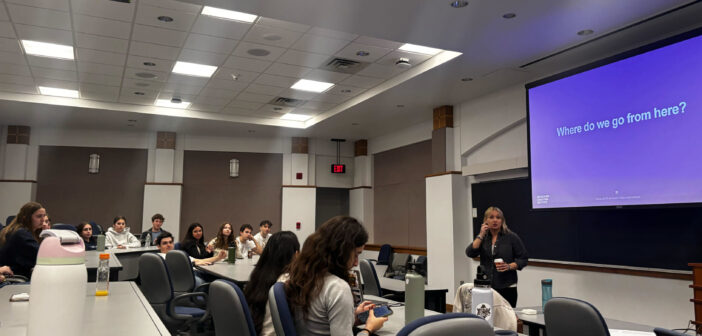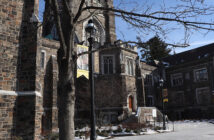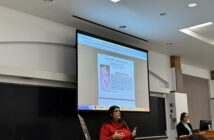Charlotte Korchak, founder and senior educator of the Jerusalem Education Institute, a nonprofit organization which educates people about Israel, delivered a lecture on Tuesday in Lehigh’s Rauch Business Center.
The title of her lecture was “Judea and Samaria in Context: History, Law, and Geopolitics.” It marked the second time Korchak spoke at Lehigh upon invitation from the Friends of Israel student organization.
In April 2024, she also spoke about the Israel-Hamas conflict, and the discussion sparked conflict. It led to Korchak being escorted out by the Lehigh University Police Department following a Q&A session. The discussion on Tuesday, however, remained civil.
In her lecture this week, Korchak said there is historical significance behind the names “West Bank,” “Judea” and “Samaria.” She said the term “West Bank” is more modern and was coined after Jordan occupied the area west of the Jordan River. “Judea” and “Samaria” come from ancient kingdoms and regions of biblical Israel.
Having lived in Jerusalem when she was a child, Korchak said she has a personal connection to the region.
She also discussed control issues that surround this specific area of land and said the land has been controlled by the Ottoman Empire, the British, the French and the Jordanians.
She described how the United Nations Partition Plan of 1947 was proposed, which divided the territory into Jewish and Arab states and was ultimately rejected by Arab leaders. Additionally, she said, deals Israel has attempted with Palestine regarding the West Bank territory have resulted in three rejected offers.
Arthur Pevzner, president of Friends of Israel, said the organization invited Korchak to educate students with facts about the Israel-Hamas conflict.
“Especially now, we have a lot of misinformation, like people spreading misinformation coming to campus,” Pevzner. “I think it’s important to have the facts also presented.”
Korchak said in her lecture both sides of the conflict have had imperfect responses to the decades-long dispute, referencing Palestianian suicide bombings that resulted in the killing of Israeli citizens and Israeli settler violence that targeted Palestinians in the West Bank.
She also said tabling and bringing more people into discussions about the conflict could allow students to avoid hostile conversations that don’t contribute to reaching a middle ground.
“There are a lot of people who are curious about what’s going on but are scared to ask,” she said. “We want to bring those people in and have legitimate conversations with them, being open and honest.”
Korchak said students shouldn’t discount conversations with others who are willing to listen to opposing viewpoints. She also said she believes it’s valuable to approach conversations surrounding the conflict from a factual, nuanced and transparent place to reach common ground.
“I’m a firm believer that most people, when you do that, they end up somewhere in the middle, and then you have less of the visual rhetoric,” Korchak said.
Hannah Gordon, president of Chabad and executive board member of Friends of Israel, said educating students about the conflict is extremely important right now.
She said it’s valuable to have Korchak share her expertise and articulate what is happening clearly and concisely to curious students.
LUPD officers were present and student IDs were scanned at the door upon check-in at the event. Pevzner said Friends of Israel did not initially want the police present, but the Office of Student Affairs said LUPD’s presence was required.
He also said the cost for police presence originally fell on the club, but after negotiations, the Office of Student Affairs agreed to cover the cost.
Hannah Null, ‘27, a member of Friends of Israel, said she attended the lecture because she has a personal connection to the area discussed, as she lived in Israel during her gap year.
“I was there during Oct. 7, and also for months after, so it is just so personal to me, both as a Jewish person and as someone who saw the physical effects of this,” Null said.
Gordon said Korchak’s discussion surrounding the criticism of Israel struck her. She also said she learned things in the lecture that will frame how she approaches future discussions surrounding the conflict.
“Now I know better how to defend Israel when those topics do come up and also acknowledge the struggles that do exist,” Gordon said. “Because it’s not perfect.”






Comment policy
Comments posted to The Brown and White website are reviewed by a moderator before being approved. Incendiary speech or harassing language, including comments targeted at individuals, may be deemed unacceptable and not published. Spam and other soliciting will also be declined.
The Brown and White also reserves the right to not publish entirely anonymous comments.